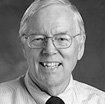Use of Voice
We all know that, in speaking, change attracts attention. When you listen to an unchanging, even voice your mind wanders. Elementary school teachers know that. Every day they speak to the age group with the shortest attention span of all. Listen to their voices! Loud and soft, fast and slow, loads of expression in their tone and on their faces. No wonder teachers of young children make good preachers. They know how to use their voices.
When you change your voice, the listeners’ attention perks up. Some people attract attention by speaking more loudly. Former seminary professor George Aus grabbed our attention by lowering his voice to a dramatic whisper, and we all leaned forward to catch what he was saying. Speeding up adds energy; slowing down adds emphasis. God gave us a magnificent instrument in our little voice boxes, and good preachers use it.
Facial Expression
“Bring your personality into the pulpit with you,” is advice I tell a lot of students. When we’re nervous we tend to go flat. People who are animated and expressive in conversation often appear wooden and colorless in the pulpit. One student recently viewed a videotape of his sermon and wrote, “A curious thing for me was to notice how tired and sad I looked….On a normal day I’m very animated….I missed a spark.” This comes from a young man who has plenty of spark in his personality and in his normal conversation! What happened in the pulpit? It was a case of nerves, a strained look on his face as he concentrated on getting the words right. He probably would not have believed he looked “tired and sad” had he not actually seen a video. After all, he didn’t feel that way, so how would he know how he actually appeared to the listeners unless he could see for himself? All preachers should videotape themselves from time to time.
Passion
Most of the above suggestions are fundamental guidelines for effective public speaking, the same counsel one receives at a noontime Toastmasters Club. I believe many of our preachers can benefit from such simple advice, but ultimately public speaking skill is a presupposition or basis for good preaching, not the thing itself. An effective preacher must be a good public speaker, but preaching is vastly more than that. Fred Craddock, the dean of homiletics professors in the United States, observed, “One can enjoy the wide reputation of being a good speaker and yet face the sad fact that hardly anyone has been altered thereby.” (Fred Craddock, Overhearing the Gospel (Nashville: Abingdon, 1978) 53.)
The best public speaker I ever had in a preaching class was a theater major with a finely trained voice and delivery style. He did all the rhetorical devices superbly well. But it was a performance. He was acting the role of a preacher, but I think others in the class also sensed that he hadn’t lived anything of what he spoke. I wrote on his manuscript, “Put your HEART in this sermon,” which wasn’t exactly accurate, but I couldn’t think of anything better on the spot.
The next speaker was a middle-aged woman, who had already told me before class that she was very nervous. Following the slick performance of the first speaker only made her more tense. She delivered her sermon in a strained voice and was clearly flustered when she stumbled a few times. Yet when she spoke of how Jesus comforted and healed the people he encountered, there was an unmistakable ring of truth to what she said. She had lived it. She didn’t shout or wave her hands, but there was a quiet intensity and passion to her sermon which swept us all up in the message.
As I said at the beginning of this article, preaching is an enormously complex undertaking. Public speaking skill is essential, though often neglected, but preaching is way more than that. Good theology is essential, and sometimes missing, but preaching is more than that. In the end, preaching is the power and joy of the gospel funneled through us earthen vessels standing in the pulpit. “The place of preaching has declined, it is true. But this is a day of new and unparalleled opportunities. They can be seized as those who know the Word seek to confront the weak and conflicting ideologies of our age by the eternally valid and dynamic Word of God.” (James Montgomery Boice, “The Great Need for Great Preaching,” in Heralds to a New Age, ed. Don M. Aycock (Elgin, IL: Brethren, 1985) 7.)
People listen to sermons burdened with two questions uppermost in their minds: “Is it really true?” and “How does this work in my life?” The most crucially important 15-20 minutes of the week are when we can stand before them and speak of the wondrous good news of what God has done for them. That task deserves the very best we can do.

